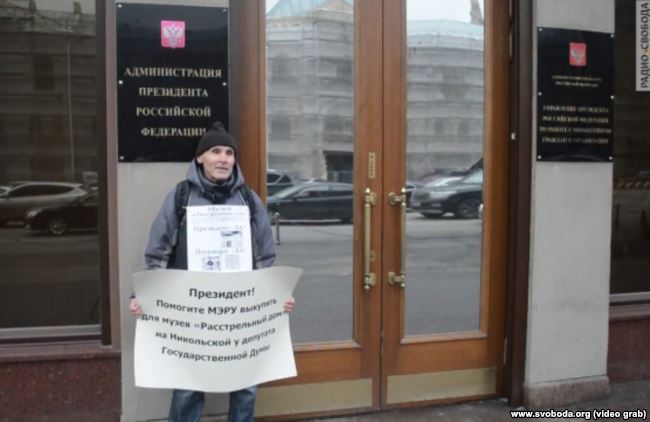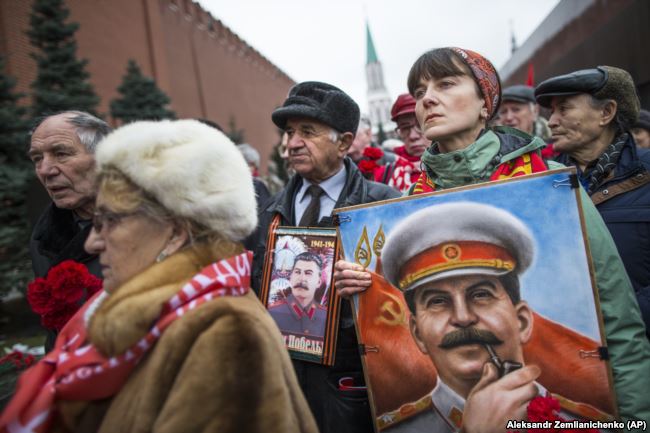Special to WorldTribune.com
By Dmitry Volchek, Radio Free Europe / Radio Liberty
Every Wednesday, Aleksei Nesterenko stands outside building No. 23 on Moscow’s Nikolskaya Street with a sign calling for it to be turned into a branch of the city’s GULAG museum. On September 12, 1938, Nesterenko’s father was executed inside that building, which at the time was home to the Military Collegium of the Soviet Supreme Court.

Nesterenko and a handful of other children of “enemies of the people” are waging an uphill battle, pushing for a law against lionizing Soviet dictator Josef Stalin.
Nesterenko, 79, told his story to RFE/RL Russian Service correspondent Dmitry Volchek on the eve of the 65th anniversary of Stalin’s death:
In March 1953, I was finishing school and on the day [Stalin’s death was announced] I had stayed home sick. When they announced that Stalin was dead, everyone went out into the streets. I walked down to the Lenin Library. Gorky Street was blocked off, so I couldn’t go in that direction since there were cars blocking the street. So I went back home to Krasin Street.
There was a portrait of Stalin in our home — a simple photograph that was probably taken from Ogonyok or some similar magazine. That portrait had always stood on a small cupboard in the main room. But when I got home, I could see the portrait had already been turned facedown.
I recently read some memoirs by Danil Granin in Novaya Gazeta. He wrote about how everyone was really upset and how they poured out onto Palace Square [in Leningrad, now St. Petersburg] when the news was announced. He says that a few years later, no matter who you asked, no one would admit that they were out crying on Palace Square. They were too ashamed. Granin talks about how it took a long time for him to stop thinking of Stalin as an idol. We all went through that.
In 1954 I graduated from school with a gold medal, and only then learned that I was the son of an ‘enemy of the people.’ I had to fill out the application for the institute, and that’s when my mother told me for the first time. Before that, I thought that my father had died during the war, like the fathers of many people. I wrote on my application that my father had been arrested by the NKVD and sentenced by the Military Collegium of the Soviet Supreme Court to “10 years in prison without the right of correspondence.”
I had a hard time getting into an institute. They refused to take my documents. I even wrote a letter directly to [Marshal Kliment] Voroshilov [who was then the chairman of the presidium of the Supreme Soviet]. Then 1956 was the year of rehabilitation; I was an ‘enemy of the people’ for just two years.
‘Every Torture You Can Imagine’
Only now am I beginning to understand the horror that my mother lived through. When my father was arrested, all our relatives vanished. Some changed their name. My mother was almost entirely alone with three children. My father was arrested when he was an official at the Civilian Aviation Institute…. He was held for nearly a year and underwent every torture you can imagine. But over the course of eight months, he didn’t confess to anything. He was arrested on September 10, 1937, and on September 20, 1938, he was executed on the order of the Military Collegium of the Soviet Supreme Court.

I really like Karl Schloegel’s book Terror And Dream: Moscow 1937. All the craziness is reflected there — how in 1937 and 1938 there would be celebrations in one part of town and tragic nightmares in another.
When my father’s “10 years without the right of correspondence” was over in 1947, when Stalin was still alive, my mother began writing to the authorities. My older brother completed his service in the army and was an active member of the Komsomol. But because he was an ‘enemy of the people,’ he was not allowed to attend a military academy. He completed a trade school and got a job in radio. At that time, there were radio sets wired into every apartment in Moscow, and he checked them and repaired them. Later, after my mother’s letters to Stalin, he was summoned to the Interior Ministry for a talk and was then allowed to apply to an institute.
‘Slandered And Libeled’
My father spent one year in the Lefortovo and Butyrka prisons in Moscow. I have read his file in the archive with the permission of the Federal Security Service — the archive on the Frunzenskaya Embankment. I made copies of several pages – they only allow you to make 13 copies out of the hundreds of pages. I made my choice and later gave copies to all my sons and nephews.
The impulse to do more came from my grandson, who was 10 years old in 2005. One day, he said, “Grandpa, let’s make a family tree.” I was horrified that I couldn’t do that. In 2007, from Memorial I got a large book with 4,000 names, the list of victims shot [at Nikolskaya Street No. 23]. That’s where my father, slandered and libeled as an ‘enemy of the people,’ received his sentence [after Stalin had signed off on the execution lists]. I heard about the long story of how Memorial had struggled to open a museum in that building. But [dissident and Memorial co-founder] Arseny Roginsky told me, “Unfortunately, I do not believe we will see a museum there in our lifetime.”
In 2010, some friends of my eldest son helped us to make a film called The Shooting House: Nikolskaya 23. It has been viewed several thousand times.
The building used to be privately owned. In 2005 the Defense Ministry sold it, and in 2016 it was sold again and is now owned by state pharmacy No. 1, which also owns Nikolskaya 21. Now the façade is being restored. I will stand in front of this building every Wednesday as long as I have the strength. We are now calling on the authorities to mark the 80th anniversary of the Great Terror by erecting information stands. Next week, I am going to the authorities to ask for permission to put up two stands with Stalin’s execution lists, and my application will be considered by people who think that everything was fine in the Stalin period and that Stalin’s execution lists are fake.
‘Information Vacuum’
We, the children of ‘enemies of the people,’ get together and discuss how Russia will never move forward without an understanding of these tragedies, even though 65 years have passed since Stalin died. The Germans have expended enormous efforts [to come to terms with their Nazi past] — in fact, that process is constantly ongoing. They talk about this all the time.
But we have an information vacuum. That is we — the still-living children of ‘enemies of the people,’ of the slandered and executed — can’t let anyone stop us. We haven’t been able to get a meeting with [President Vladimir] Putin, but we keep going to the presidential administration to demand a meeting at least with [first deputy head of the presidential administration Sergei] Kiriyenko.
Since the presidential election campaign started, we have held two Wednesday pickets, despite the cold. Last time there were two women with me; the fathers of both of whom had been executed. For the sake of our children and grandchildren, we have to force the authorities to speak out.
There are those who say that we shouldn’t talk about this, that we’ve had enough, and it is all in the past. For instance, [Communist Party presidential candidate Pavel] Grudinin. It is simply shameful to listen to him. A person who pretends to the presidency but all the time he’s saying, “All that is in the past. We need to move forward.”
People don’t understand that we cannot move forward with this law.
People come up to me [when I’m picketing] and they are supportive by a ratio of about 10:1. Sometimes people try to tell me that Stalin’s execution lists are fakes, even though I show them copies with Stalin’s signature on them. Sometimes there are truly horrific scenes when people begin to tell me that “they didn’t shoot enough of your type.” All I can do is shrug and smile at them.
